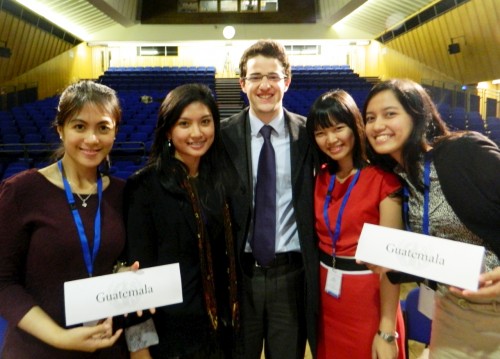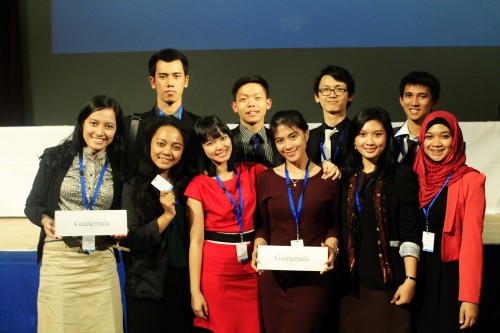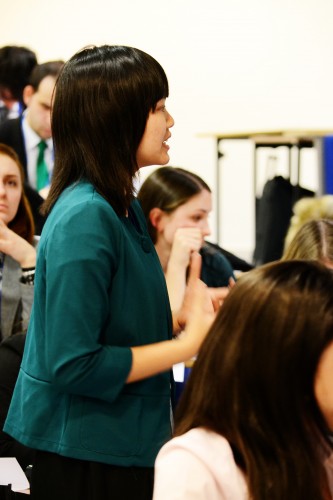Hi, what is your name? What do you study? And how many times you have participated Model UN?
Hi, my name is Marsha Imaniara (Marsha). I am a recent graduate of International Relations Department, Universitas Katolik Parahyangan, Bandung, Indonesia. To date, I have participated in about three local/national-scale MUNs and three international-level MUNs.
How did you know about Model UN and what was your first impression about it?
I first found out about MUN and participated in one when I was in senior high school. I was selected by my teachers to represent my school in Parahyangan Model United Nations (PMUN) 2009, and thanks be to God, I won the Best Spokesperson award. It was an unforgettable experience for me. I fell in love right away with MUN. It was a great platform for youth to actually stand in the shoes of our leaders and diplomats, to speak up and have our say in a global setting, to meet different people from very different background and constantly have something new to learn. In short, MUN was awesome!
What motivates you to participate in LIMUN?
I was interested to participate in London International Model United Nations (LIMUN) 2014 because it was the largest annual university-based MUN in Europe, in which more than 1,500 delegates from across the globe participated. It was a great opportunity to widen my horizon through working together with youth from all over the world to seek solutions to pressing global issues as well as through networking. Furthermore, LIMUN also offered a wide range of committees and themes. A number of committees catered to my huge interest in Development issues and I thought they would certainly enhance my knowledge on the matter.

“To speak up and have our say in a global setting, to meet different people from very different background and constantly have something new to learn,” said Marsha Imaniara
Lo and behold, Djarum Foundation – which funded my study for the past year – was also looking for their own delegates to represent the Foundation in LIMUN 2014. So I thought what a perfect match! I applied right away for the position. Thanks be to God, I was chosen as the Head of Djarum Foundation Delegation for LIMUN 2014. My delegation consisted of 10 delegates (including me) from 6 different cities and 8 different universities. The other delegates are: Amelia Desy Ratna Yuwita (Universitas Airlangga, Surabaya), Gerardus Yosua (Institut Pertanian Bogor, Bogor), Indrajaya Sartono (Universitas Kristen Satya Wacana, Salatiga), Olivia Renanda (Institut Teknologi Sepuluh Nopember, Surabaya), Reinhardt Graciano Rongre (Institut Teknologi Bandung, Bandung), Rizka Khairani (Universitas Airlangga, Surabaya), Tegar Succliftom (Institut Teknologi Sepuluh Nopember, Surabaya), Venty Indah Utami (Universitas Sriwijaya, Palembang), and Yolanda Marsyella Simangunsong (Universitas Udayana, Denpasar). We are all Beswan Djarum (recipient of Djarum Beasiswa Plus scholarship provided by Djarum Foundation Bakti Pendidikan), by the way.
What country did your delegation represent and in what council?
Our delegation was assigned two different countries in ten different committees. I got South Sudan, while the rest of my delegation got Guatemala. The committees we were in were: DISEC, SPECPOL, SOCHUM, ECOFIN, UNESCO, UNDP, UNODC, UN WOMEN, UNEP, and Legal.
We prepared for LIMUN for about two-three months. Indeed, being a delegation that consisted of delegates from different cities and universities made it slightly more complicated. However, we managed to have four National Trainings, in which Djarum Foundation gathered the ten of us in Jakarta. We had Josefhine Chitra, a former MUN-consultant, as our coach to guide our training. We learned all kinds of things from public speaking, procedural and substantive drill, and committee simulation. Furthermore, in between the trainings, I as Head of Delegation prepared a series of electronic Training Kits (procedural and substantive explanations, tips and trick, quizzes) for my delegates to study independently as well.
In the end, all the hard work paid off. We managed to dedicate active participation in LIMUN 2014 and sponsor various working papers and draft resolutions. Most importantly, our delegate Reinhardt Graciano Rongre became the only Indonesian delegate to win a LIMUN award: Best Position Paper in LIMUN’s UNESCO! It was such a joy and an honor for all of us.

“Being a delegation that consisted of delegates from different cities and universities made it slightly more complicated. However, we managed to have four National Training”
How did Djarum Foundation delegation prepare and fund for LIMUN?
We prepared for LIMUN for about two-three months. Indeed, being a delegation that consisted of delegates from different cities and universities made it slightly more complicated. However, we managed to have four National Trainings, in which Djarum Foundation gathered the ten of us in Jakarta. We had Josefhine Chitra, a former MUN-consultant, as our coach to guide our training. We learned all kinds of things from public speaking, procedural and substantive drill, and committee simulation. Furthermore, in between the trainings, I as Head of Delegation prepared a series of electronic Training Kits (procedural and substantive explanations, tips and trick, quizzes) for my delegates to study independently as well.
In the end, all the hard work paid off. We managed to dedicate active participation in LIMUN 2014 and sponsor various working papers and draft resolutions. Most importantly, our delegate Reinhardt Graciano Rongre became the only Indonesian delegate to win a LIMUN award: Best Position Paper in LIMUN’s UNESCO! It was such a joy and an honor for all of us.
In your opinion, what are the opportunities and challenges for Indonesians to participate in Model UN overseas?
If we’re talking about opportunities, they are endless! More and more MUNs are turning into international level – meaning, they are looking for us, really, to participate. Furthermore, increasing number of universities and other institutions now also offer financial supports in varying degrees for us to participate in those overseas MUNs. We just need to keep our eyes open for these opportunities and proactively search for them.
However, the challenges, too, still remain. For instance, not so many institutions offer full financial support. It almost always means that only those who are capable enough to fund the rest of the costs independently can really participate in such MUNs. Furthermore, believe it or not, we also still experience various other more substantive barriers, for instance language barrier. Another example is in terms of preparation. I see that we are yet to actually have a research binder, or speech drill, or other exercises that would help us compete effectively with other delegates from more advanced countries, say, the United States. However, these are all challenges that I believe we can overcome with measures such as refurbishing our MUN communities.




